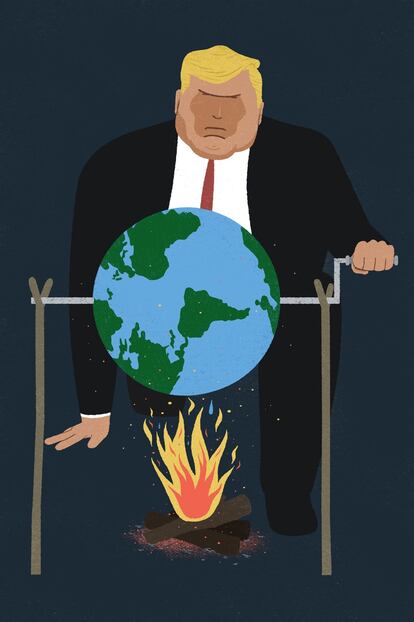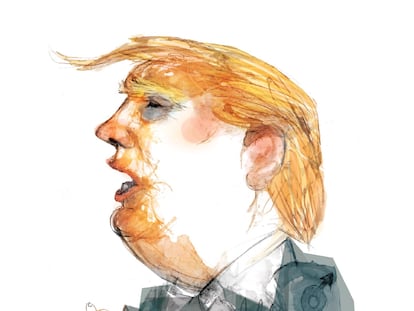The US elections and global governance
The presidential race is important, but it won’t change things all by itself. The world needs institutions that are able to control inequality, poverty, environmental destruction and war

The Trump phenomenon is a product of globalization, at least the dominant form of globalization that characterized recent decades. Globalization refers to interconnectedness in all spheres of activity (political, cultural, economic, legal, personal and so on); it is associated with the revolution in information and communication technologies. It tends to be equated with the global market and pro-market policies, especially the free movement of capital and goods (but not labour). But it has also produced greater global consciousness about such issues as climate change, war, extreme poverty and indebtedness, and repression. The 2016 American presidential election was framed in terms of the ordinary American versus the global elite. Trump represented nationalism; Hillary Clinton represented neo-liberal globalization. If Joe Biden wins the forthcoming US elections, can he stimulate a different kind of globalization, one that takes into account our concerns about the social and ecological future of the planet?
Trumpism has parallels with similar developments in other parts of the world – Brexit in Britain, Orban in Hungary, Putin, Modi or Bolsonaro. What they share is a mixture of crony capitalism and extremist identity politics – racism, ethnic nationalism or religious fundamentalism. Their ideologies also promise a revival of a sordid patriarchy involving misogyny and homophobia. The emergence of this toxic movement is an outcome of neo-liberal globalization in two main respects. First, the combination of economic liberalisation and austerity resulted in dramatic increases in inequality worldwide, especially after the 2008 financial crisis. The burden of austerity aimed at reducing public debt fell on the poorest people while the banks and the very rich were not even sanctioned. In particular, the traditional industrial areas – the rust belt in the US, the “red wall” seats in Britain, large parts of the post-Communist world – were hard hit by the international competition and the flight of capital and became the “left-behind areas” or the “places that don’t matter.” It was frustrated, disempowered people from those areas that elected Trump.
Biden appears to have departed from the neo-liberalism of his predecessors and has committed himself to social justice and a big programme of investment in renewable energy
Secondly, the growth of global money flows and reliance on mineral revenues, especially oil, created rentier states, that is to say, states reliant on borrowing or rent instead of taxation, and this gave rise to rent-seeking behaviour – the phenomenon known as the “resource curse” by those who study oil-dependent countries. This was compounded by privatisation and the contracting-out culture whereby the state pays private companies to implement public functions such as prisons. The end result was the emergence of new elites in which oligarchs and politicians became interchangeable – the oligarchs finance the political campaigns and the politicians give contracts to the oligarchs. In the US, the military industrial complex has been involved in this kind of activity for years; but more recently, Trump has added his own family of companies with interests in places such as Russia and Israel.
Populist authoritarian leaders are not able to reverse the consequences of neo-liberal globalization. Trump’s protectionist policies, his trade wars, the restraints on immigration, or the rejection of multilateralism – withdrawal from the Iran deal, the WHO or the Paris Climate Accords – do not benefit his base of support even though many of them have remained surprisingly loyal. In the UK, Boris Johnson has spent literally billions on private contracts to companies that supported the Conservative Party and the Brexit campaign, yet he appears unable to provide sufficient financial support to those who voted for him in the red wall seats. Protectionism is what the late sociologist Ulrich Beck would have called a zombie concept; an idea that despite being killed off repeatedly always bounces back. Because all activities, especially economic activities, are so interconnected, nationalist restraints on trade aimed at short-term advantages just makes things worse. Likewise restricting migration does not free up the sort of jobs that suit people in the left-behind areas; rather the restrictions slow down economic activity. The nationalist and racist framing may help to win power but it cannot provide solutions to those who are vulnerable to its rhetoric.
Rather, what is needed is global reform. The world needs global institutions that can tax, regulate or control global “bads” such as inequality and poverty, environmental destruction and war. Already, global economic institutions such as the World Bank and the IMF are moving away from austerity policies but this requires a massive programme of debt restructuring to be sustainable. The world also needs to tax the global giants such as Google, Amazon or LVHM that escape national jurisdictions, to control financial speculation and to tax carbon emissions. And we need institutions that can promote global “goods” like social and economic redistribution, tackling poverty, cooperation in global pandemics, inclusive measures to halt climate change, and efforts to address wars, terrorism, transnational crime, and other types of violence.
There is also a real danger that even if Biden wins the election, he will not be able to take power. Trump’s extreme right-wing supporters are arming themselves
Will a Biden victory make this possible? Biden appears to have departed from the neo-liberalism of his predecessors and has committed himself to social justice and a big programme of investment in renewable energy. He has also undertaken to rejoin the Paris Climate Accords and the WHO and to respect the Iran deal. He talks about “restoring American leadership.” Nevertheless, he comes from the same stable as his Democrat predecessors and, like all American politicians, is beholden to corporate sponsors. Moreover, a Biden victory will not change the behaviour of Russia, China or India, making the task of reviving multilateralism much more difficult. What’s more, the American brand is badly tarnished by the Trump years, weakening international trust in American promises.
There is also a real danger that even if Biden wins the election, he will not be able to take power. Trump’s extreme right-wing supporters are arming themselves. In other parts of the world, failing leaders have fomented violence to save their positions. Trump is eerily reminiscent of Milosevic; it was rurally based unemployed factory workers that formed the armed gangs that inflicted such horrors on Bosnia and Kosovo. Biden will have to cope with the social monster Trump has created. It is possible to conjure up a nightmare scenario of a segmented, divided and partly violent America.
This is why it is so important to reform global governance and why the task cannot be left to Biden. Globalization does have its other side. It is also associated with the emergence of global civil society and global governance. The 1980s, 1990s and the early 2000s witnessed the growing importance of human rights and democracy, the growth of international peace operations, and the growing pressure to do something about climate change culminating in the Paris Peace Accords. These achievements were perhaps short lived and some were tainted by association with neoliberalism. The rise of populist authoritarianism has marked the return of geopolitics, albeit in a new form characterised by competitive cyberattacks and dangerous interference with technology and special forces and air attacks in a range of conflicts. But global civil society has not gone away. Demonstrations in places such as Sudan, Iraq, Lebanon or Belarus directly address the combination of crony capitalism and extremist identity politics. “In the name of religion, they are looting us,” goes the slogan of the Iraqi protestors. Moreover, these protests are led by women; by taking the frontline they are able to deflect violence. The spread of Black Lives Matter took place despite Covid restrictions. Biden can offer an opening for reforming global governance as can the European Union but it requires pressure from below to marginalise populist authoritarianism and to call on both the US and the EU to restrain global “bads” and push for global “goods.”
Mary Kaldor is a professor at the London School of Economics, where she is also the Director of the Civil Society and Human Security Research Unit.
Tu suscripción se está usando en otro dispositivo
¿Quieres añadir otro usuario a tu suscripción?
Si continúas leyendo en este dispositivo, no se podrá leer en el otro.
FlechaTu suscripción se está usando en otro dispositivo y solo puedes acceder a EL PAÍS desde un dispositivo a la vez.
Si quieres compartir tu cuenta, cambia tu suscripción a la modalidad Premium, así podrás añadir otro usuario. Cada uno accederá con su propia cuenta de email, lo que os permitirá personalizar vuestra experiencia en EL PAÍS.
¿Tienes una suscripción de empresa? Accede aquí para contratar más cuentas.
En el caso de no saber quién está usando tu cuenta, te recomendamos cambiar tu contraseña aquí.
Si decides continuar compartiendo tu cuenta, este mensaje se mostrará en tu dispositivo y en el de la otra persona que está usando tu cuenta de forma indefinida, afectando a tu experiencia de lectura. Puedes consultar aquí los términos y condiciones de la suscripción digital.











































